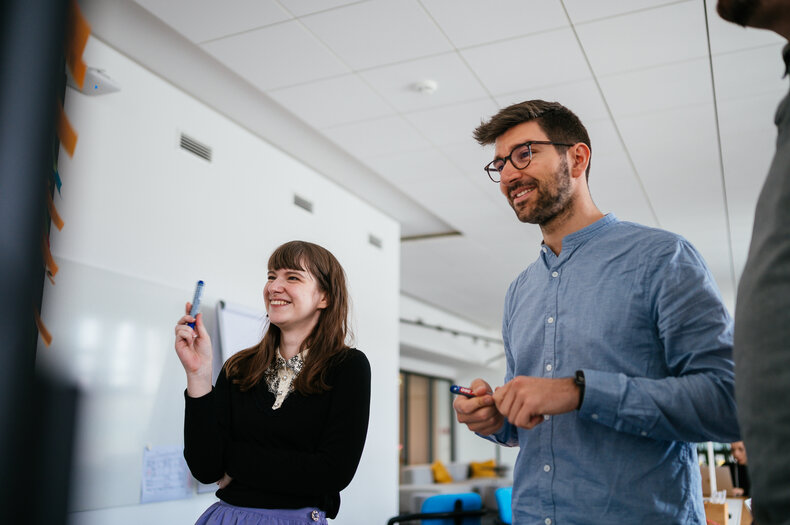- Zurück
-
Investor Relations
- To the overview
- IR-News
- Reports
- Presentations
- Annual General Meetings
- Corporate Governance
- Delisting
- Zurück
-
Newsroom
- To the overview
- Press releases
- Press service
Rita tells you more about working as Team Lead Organizational Development at kununu and why this job is so special.
Interview
... what you enjoy most about working as an Organizational Development at kununu.
What I enjoy most is the opportunity we had to create this amazing team and support the company by actively shape our culture and help people grow—both individually and collectively. At kununu, we're passionate about creating a workplace where people feel empowered, supported, and heard. In Organizational Development, I get to work on initiatives that bring our vision forward creating a learning organization—whether it’s designing learning programs, coaching individuals and teams, facilitating workshops, or supporting teams through change.
Can you share insights on a specific agile transformation project you led?
Two projects come to mind that I’m especially proud of of achieving this year.
The first was designing and implementing a company-wide onboarding plan. Starting a new job can be overwhelming, so the goal was to create a structured yet welcoming experience that helps new joiners feel connected, informed, and confident from day one. It is being a full journey—from understanding pain points to aligning with different departments and creating resources that reflect our culture.
The second project was a collaboration across the Organizational and Enablement Department, where we co-created an internal training catalogue. Our aim was to give all employees easy access to relevant learning opportunities, tailored to both their personal development and our company’s strategic goals. It was a real team effort—bringing together diverse perspectives to curate meaningful content and make learning part of our everyday culture.
What are some key principles you find particularly effective when working with teams?
One key principle I always come back to is psychological safety. When people feel safe to speak openly, share ideas, and admit mistakes without fear of judgment, that’s when real collaboration and innovation happen. As a team lead, I try to create that space by listening actively, being transparent, and showing vulnerability myself.
I also believe in meeting people where they are. Every team and every individual is different, and being curious, empathetic, and adaptable goes a long way in building strong, resilient teams.
What are the key performance indicators (KPIs) or metrics you focus on to evaluate the success of an agile team?
Creating a learning organization is a continuous journey, and measuring its success means looking at both qualitative and quantitative signals.
One of the key metrics we rely on is the employee satisfaction survey. It gives us valuable insights into how people perceive learning and development opportunities, psychological safety, collaboration, and overall engagement. It helps us spot trends, identify gaps, and track how our efforts are resonating across the company over time.
We also place a strong emphasis on feedback collected after every training, onboarding, or initiative we support. This real-time input helps us understand what’s working, what needs adjustment, and where we can improve. Beyond numbers, it’s often the open comments that reveal the most—stories of how someone applied what they learned or felt more confident after a session.
How do you facilitate continuous improvement culture within teams?
For me, fostering a culture of continuous improvement starts with mindset. It’s about creating an environment where learning, experimenting, and evolving are not just encouraged—they're expected and celebrated. I try to model this by being open about what I’m learning, asking for feedback regularly, and showing that it’s okay not to have all the answers.
One key approach is making reflection a regular habit, not just something we do at the end of a project. Whether through retrospectives, feedback loops, or simple check-ins, I encourage teams to pause and ask: What’s going well? What could be better? What can we try next?
What is the next big initiative or project you are working on to achieve a learning organization within the organization?
Right now, I’m really excited to be working on the planning and rollout of our next Hackweek — a company-wide initiative that brings together participants from across all departments at kununu.The goal is to create dedicated space for creativity, experimentation, and cross-functional collaboration, all core elements of a learning organization.
What makes this initiative especially meaningful is that it’s designed to be inclusive and accessible to everyone—not just tech or product teams. We’re creating an environment where learning is hands-on, team-driven, and celebrated. And beyond the projects themselves, it’s a great opportunity to strengthen relationships, share knowledge, and inspire a mindset of continuous improvement across the company.
What qualities do you believe are essential for succeeding as an OD at kununu? Any advice for candidates considering applying?
To thrive as an Organizational Development (OD) professional at kununu, you need a strong mix of empathy, curiosity, and adaptability. Our environment is dynamic and people-centric, so being able to listen deeply, understand the needs of different teams, and design thoughtful, practical solutions is key.
You should also be comfortable navigating ambiguity—we often work on complex challenges that don’t have a clear right answer. It helps to have a mindset of experimentation and to see feedback and iteration as essential parts of the process.
Lastly, collaboration is everything. We work closely with teams across the company, so being a strong communicator, a team player, and someone who brings positive energy into the room goes a long way.
NEW: AI powered job search
